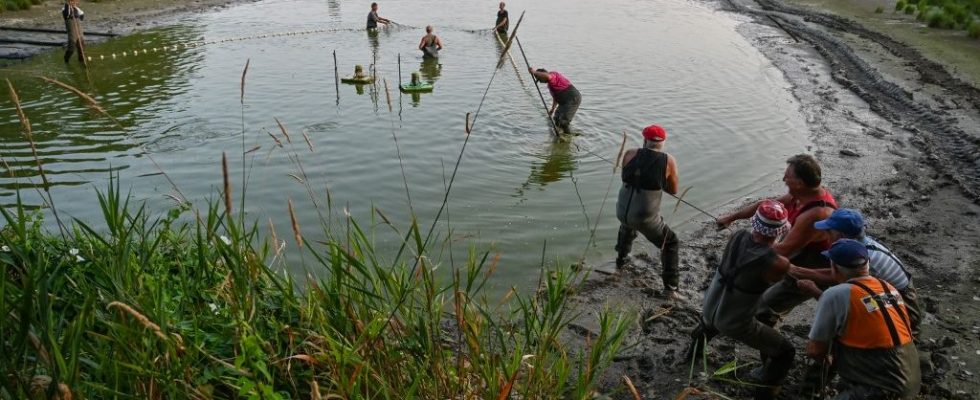In the Dombes wetland (Ain), meadow grass grows in the middle of the dry pond. The drought has forced fish farmers to make choices in order to preserve their production, which could halve this year. The Dombes sector produces 1,000 tonnes of pond fish per year (carp, pike, tench, roach, zander, etc.), ie one third of French production. During previous droughts in 2019 and 2020, production was around 600 tonnes, but this year production is struggling to reach 500 tonnes.
“In Joyeux we had 460 mm (of rain) spread over four months”
If the region has already experienced a lack of water, the drought that has lasted since the previous autumn has particularly affected fish farming. “It’s unheard of in the Dombes. We had to sacrifice some ponds, ”explains Jules Blanc, adviser to Apped, the Association for the Promotion of Fish from Dombes Ponds, which brings together the interprofessional sector, from the operator to the processing companies.
If production in 2022 had been good despite a hot and dry summer, the situation is more complicated this time. It was necessary to choose to fill a certain number of ponds and to leave others dry. “In Joyeux we had 460 mm (of rain) spread over four months. With even zero in October, and 5 mm in February”, summarizes Gillian Noël, versatile fish farming technician at one of the main owner-operators in the Dombes.
Today six ponds are usable out of the 23 available
As a result, of the owner’s 23 ponds, he started the season with 15 ponds in operation, instead of the 18 planned. But now “I only have six left” in operation, he says, as the coming weeks promise to be decisive before the fisheries scheduled for October.
In front of a second pond where the water has also receded, the waders advance far into the mud, watching for the few fish that remain in the depths of the pond. “This pond normally holds 17-18 tons of fish. This year, he made 230 kg, on three tons of stocking, can only note Jules Blanc. We had learned lessons. We know that when the pond is not full, we do not spend the summer. We adapt. »
Measures are taken to better manage the drought
According to Apped, several measures have already been taken to better manage water: maintenance of the network of ditches to capture as much water as possible, optimization of water between chains of ponds, aeration of ponds during critical periods in particular with solar aerators, introduction of more resistant species in hot water, such as the black bass, a predator from North America, or even experiments to save water such as organizing fishing without emptying the ponds.
“In the short term, we will need support from the public authorities, otherwise the sector may not recover,” pleads Jules Blanc, addressing the department and the region. “This year, we are asking for additional help, we need it. The issue is also important for the surrounding nature, underline the fish farmers: the Dombes is the most important wetland in Europe in terms of biodiversity.

